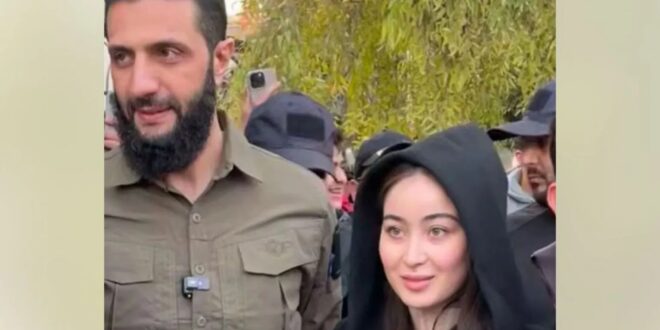Syria’s rebel leader, Ahmed al-Sharaa, has dismissed the online controversy over videos showing him gesturing to a young woman to cover her hair before he posed for a photo with her last week.
The incident sparked criticism from both liberal and conservative commentators amid intense speculation about the county’s future direction after rebels swept to power.
Liberals saw the request from the head of the Sunni Islamist group Hayat Tahrir al-Sham (HTS) as a sign that he might seek to enforce an Islamic system in Syria after leading the overthrow of Bashar al-Assad, while hardline conservatives criticised him for consenting to be photographed with the woman in the first place.
“I did not force her. But it’s my personal freedom. I want photos taken for me the way that suits me,” Sharaa said in an interview with the BBC’s Jeremy Bowen.
The woman, Lea Kheirallah, has also said that she was not bothered by the request.
She said he had asked in “gentle and fatherly way”, and that she thought “the leader has the right to be presented in the way he sees fit”.
However, the incident demonstrated some of the difficulties any future leader of Syria might have in appealing to and uniting such a religiously diverse country.
Sunni Muslims make up the majority of the population, with the remainder split between Christians, Alawites, Druze and Ismailis.
There is also a wide range of views among the various political and armed groups who were opposed to Assad, with some wanting a secular democracy and others wanting governance according to Islamic law.
HTS, a former al-Qaeda affiliate, initially imposed strict behaviour and dress codes rules when it seized control of the former rebel stronghold of Idlib province in 2017. However, it revoked those rules in recent years in response to public criticism.
The Quran, Islam’s holy book, tells Muslims – men and women – to dress modestly.
Male modesty has been interpreted to be covering the area from the navel to the knee – and for women it is generally seen as covering everything except their face, hands and feet when in the presence of men they are not related or married to.
Lea Kheirallah asked to take a photo with Sharaa – who was previously known by his nom de guerre Abu Mohammed al-Jolani – when he toured the Mezzeh area of Damascus on 10 December.
Before agreeing, Sharaa gestured for her to cover her hair and she complied, raising the hood on her jumper and then standing beside him for the photo.
Many video clips and pictures of the incident were shared on social media, sparking widespread outrage among ordinary users and media commentators.
People with liberal or non-conservative views saw it as a troubling glimpse into Syria’s possible future under HTS, fearing increasingly conservative policies like the requirement for all women to wear a hijab, or headscarf.
France 24’s Arabic channel discussed the incident, with a headline asking if Syria was “heading towards Islamic rule”.
Others were sharper in their condemnation. One Syrian journalist said: “We replaced one dictator with a reactionary dictator.”
On social media, other commentators warned of “ultra-extremists” ascending to power, while others decried the “forcing of a free woman” to adopt a conservative look.
Islamist hardliners on Telegram criticised Sharaa for agreeing to be filmed and photographed next to a young woman in the first place.
Some called Ms Kheirallah a “mutabarijah” – a negative term for women considered immodestly dressed or wearing make-up.
Such hardline figures ranged from clerics to influential commentators whose views are often shared and read by Syria-focused conservative communities online, and are likely to reach HTS supporters and possibly officials.
Most of them appear to be based in Syria, mainly in the former HTS-dominated rebel stronghold of Idlib, with some having previously served in HTS ranks.
They argued that it was religiously impermissible for unrelated men and women to interact closely and accused Sharaa of seeking “vain public attention” and showing “indulgence” in matters contrary to strict religious teachings.
A post on one Telegram channel called Min Idlib (From Idlib) said the HTS leader was “too busy taking selfies with young ladies” to address demands for releasing prisoners from HTS jails in Idlib.
Many of the conservative figures who spoke out against the photo have criticised Sharaa in the past for political as well as religious reasons, and include clerics who have left HTS.
 Eurasia Press & News
Eurasia Press & News




